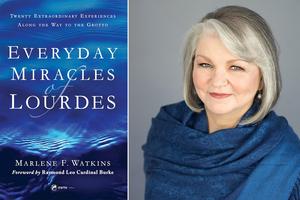‘The Miracle Club’ Is Flawed, But Gets One Thing Right About Lourdes
Our Lady’s message of hope shines brightly in the grotto, a rising star that points us to her Son

The first time I bathed in the waters of Lourdes, it was the 1980s, and the impact of its frigid waters stunned me and left a slightly negative impression. When I returned to the pilgrimage site 20 years later as a member of the Order of Malta, I accompanied the sick to the baths but did not go myself, shuddering at the memory of that first visit.
Another decade slipped by before I gathered up the courage for a second plunge. This time, the water was surprisingly warm. And I found myself weeping tears of joy as if I were an adult convert just initiated into the waters of Baptism.
Veteran members of Malta’s annual Lourdes pilgrimage grew accustomed to the unpredictable nature of the baths, as well as the powerful, seemingly accidental bonds forged between fellow pilgrims: the sick and the physically healthy, the child with Down syndrome and the adult cancer patient petitioning Our Lady for just one more year of life.
“Each of us has our own story and our own baggage that we give to Our Lady,” my friend Charlotte Kiessel, a member of the Order of Malta and a seasoned volunteer at the baths, has observed.
“We volunteers can only guess at the full meaning of the physical and spiritual healings that leave a person transfixed with joy.”
The long-established ritual governing the baths at Lourdes, with each person disrobing, then wrapping up in a wet sheet, and finally being gently guided into the water by volunteers, reinforced the sense that the pilgrim was being stripped naked in a “total surrender” to the Lord and his mother.
That ritual was suspended during the COVID pandemic, when the baths were closed. And a new practice has now been established: Pilgrims recite special prayers as they imitate St. Bernadette’s practice of washing her face and hands with the water that came from the life-giving spring.
Last week, I reflected on my experiences in the baths as I watched a new movie in theaters, The Miracle Club. A film about a group of Irish women who visit the pilgrimage site in 1967, it highlights a key lesson of Lourdes, even as it often treats the faith that animates the characters as little more than a plot device.
Directed by Thaddeus O’Sullivan, this comedy-drama begins in a Catholic parish in Dublin where a group of friends join forces for a talent show. They win the first prize — a bus tour to Lourdes.
Two aging friends, Lily (Maggie Smith) and Eileen (Kathy Bates), are joined by Dolly (Agnes O’Casey), a young mother with a son who has never spoken, and who hopes for a miracle at the shrine. Before the bus departs, with the pastor (Mark O’Halloran) on board, Chrissie (Laura Linney), the daughter of a recently deceased parishioner, shows up, disconcerting the older women and signaling trouble ahead. Forty years earlier, Chrissie emigrated to the United States. The town hasn’t stopped gossiping about the backstory that led to her exile.
Chrissie’s unexpected return and decision to join the pilgrimage forces the older women to come to grips with their role in a tragedy that upended all their lives.
At the start of this journey, the older women don’t seem to have a strong motive for traveling to Lourdes, beyond the appeal of a free trip. That fact tees up one comic element of the story: the disconnect between the religious piety of many Lourdes pilgrims processing through the grotto and the backbiting and overdramatic behavior of this crew.
Chrissie gives them a reason to begin a long-delayed examination of conscience that demands some kind of reconciliation. Will they rise to the occasion, or let the precious opportunity slip by as they cling to their grudges and grievances?
The baths at Lourdes pose a special challenge for these Irish women. They have carried their particular crosses for most of their adult lives, and now they are being asked to surrender everything to Our Lady.
Yet the dramatic potential of this emotional and spiritual reckoning is undercut by a subplot that follows the struggles of their clueless husbands who must manage the family household back home while their wives are away. A half-century ago the division of labor in many marriages kept most men out of the kitchen, but this plot line feels stale. It also leaves less time for a richer portrait of the pilgrims’ faith life. What do they believe? What gives them solace?
That said, the characters’ dilemma at the baths highlights the special gift that Lourdes offers every petitioner who finds their way to the grotto, from the parent of a suffering child to the disabled adult who fears the isolation of old age.
Each person who processes before the basilica at Lourdes, holding a candle aloft to light their path as they sing hymns and recite the Rosary engages in a silent internal debate over the possibility of hope, of miracles, of a divine love that makes their sorrow bearable.
I will never forget the exchange I witnessed between a pilgrim with metastatic cancer and a priest.
“Is it all a sham?” asked the pilgrim, a physician, his face white with strain and tinged with despair. The priest responded quietly, but confidently: “Our faith is a faith of hope.”
The pilgrim relaxed as he let go of his fears and pondered this truth.
“You don’t come to Lourdes for a miracle, Eileen,” the priest in The Miracle Club tells one character. “You come for the strength to go on when there is no miracle.”
Whatever the limits of this imperfect, often frustrating film, it gets one thing right: Our Lady’s message of hope shines brightly in the grotto, a rising star that points us to her Son.
Editor's Note: This article has been updated.

















